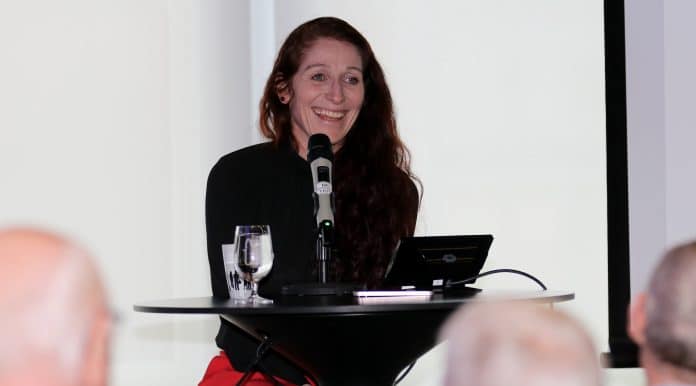The Norwegian Football Federation is, arguably, first among equals when it comes to support for the Sustainable Development Goals (SDGs), or the Global Goals, in the world of football.
The new United Nations initiative Football for the Goals gives the Norwegians a special role by undertaking a pilot project to apply the commitments of the initiative.
“We are proud to be a part of this with our pilot project,” Lise Klaveness, the President of the Norwegian Football Federation told the UNRIC website.
Women’s Euro
Football for the Goals was launched at the beginning of the Women’s Euro in England on 6 July, to provide a platform for the global football community to engage with and advocate for the Sustainable Development Goals.
While the Union of European Football Associations (UEFA) joined the initiative as its inaugural member, the Norwegians’ pilot project is meant to demonstrate how its national teams, grassroots football and leagues, and its media partner, will work together to support the Goals (SDGs).
“We are very motivated and we want to change our behaviour, challenge ourselves and raise awareness,” Klaveness said. “It gives us even more motivation and a kick in the butt.”
Challenges

Photo: Vegard Grøtt / BILDBYRÅN /NFF
The Norwegian is very well-aware of the fact that when it comes to the Sustainable Development Goals football’s record is unequal. She points nevertheless to recent successes that rhyme well with the aims of the Sustainable Development Goals.
Climate change, however, is more of a challenge. “Travelling is at the core of what we do”, Klaveness says, speaking from the Women’s Euro in England. Reducing CO2 emissions generated by air transport may not be easy to deal with. Football players who, for instance, participate in UEFA’s Champions League, have a punishing schedule with up to 3 matches a week that theoretically can demand travel from Iceland to Azerbaijan or northern Norway to Malta.
“It is difficult to be on the forefront, given this fact. We have to be humble, but although we perhaps cannot lead the way on this issue, we have to look in the mirror. We have to 
Integration and inclusion
“The Sustainable Development Goals are more than climate, so we can also raise awareness on equality, health and inclusion. Integration of refugees and inclusive work with drug addicts are among our past successes in Norway,” she adds.

Norway´s football clubs have, for instance, offered equal opportunities to boys and girls. Indeed, the interest of the Federation is not top-down – it comes from the grassroots. Klaveness explains that the Federation is acting on sustainability on the initiative of the countries’ top clubs. “It comes from the clubs themselves, they asked us to take action. So we have to give them credit. Our role is to give them water and oxygen.”
Hopefully, influential star players will join Football for the Goals. There is, however, a reason to be optimistic, if the actions of a top Norwegian player are anything to judge from. Norwegian international Morten Thorsby is a professional player with Italy´s Sampdoria.
We play green

While most of his colleagues rested after a difficult season, he travelled around Europe to promote “We Play Green” an environmental football movement he launched, which is committed to creating more sustainable attitudes and actions.
“The climate issue is also affecting our sport. It will affect players, their future, and their children. This is something we must understand and we must use our role to help,” he told Norwegian televison TV2 in Brussels recently. He visited the EU capital for meetings with senior EU and UN officials including Veronika Safrankova, the Head of the UN Environment Programme Brussels Office and Frans Timmermans, the First Vice President of the European Commission.
Klaveness says that players cannot be drafted to participate in the Football for the Goals initiative. “It is on voluntary basis, but they have to be part of it.”
Klaveness is one of only a handful of women who lead football federations in the world. A lawyer by training, she played 73 matches for the Norwegian national team 2002-2011.
Human rights
She attracted world attention with a speech at an event in the run-up to the World Cup in Qatar. In front of the hosts, the FIFA leadership and an audience of mostly males, she criticized the world football federation and the organizers, for among other things the treatment of migrant workers. Although she has made firm statements on the necessity of including values such as human rights and inclusion in the process of awarding World Cups, she is well-aware of the need to respect other cultures.

Photo: Vegard Grøtt / BILDBYRÅN /NFF
“My starting point is that football should be played by all, everywhere and no country should be excluded. It is not Norway´s role to go and dictate to others. However, FIFA should award the hosting of the World Cup in a transparent way with due dilligence process where the respect for labour and human rights are integrated parts of the decision. Football is so global, and involves so much money that brave, ethical and transparent leadership is needed in every part of the international bodies, and it is urgent to change course here.”
Norway did not qualify for the World Cup in Qatar. However, they are with other Nordic football federations candidates for hosting the 2025 UEFA Women’s Championship.
“Sustainable football values will be at the core,” she promises.







